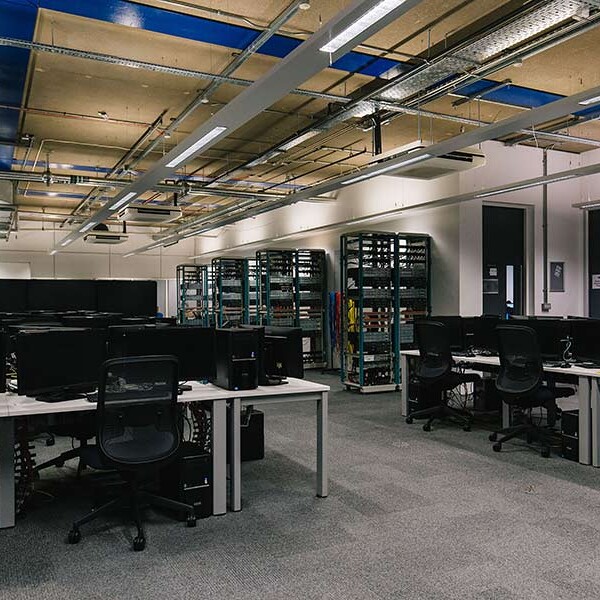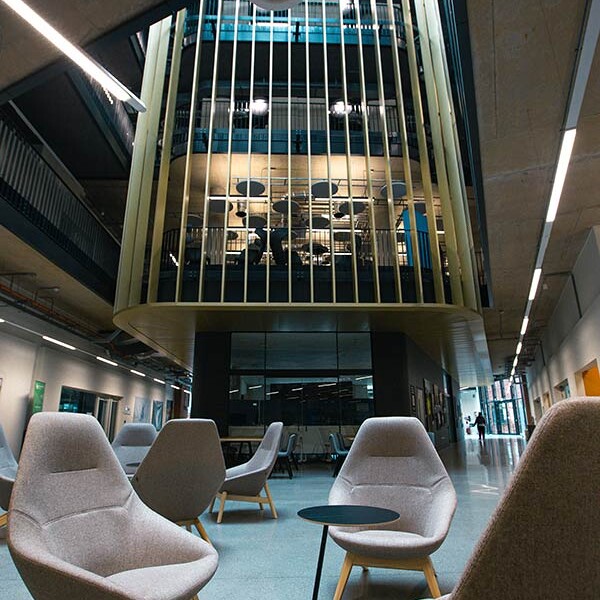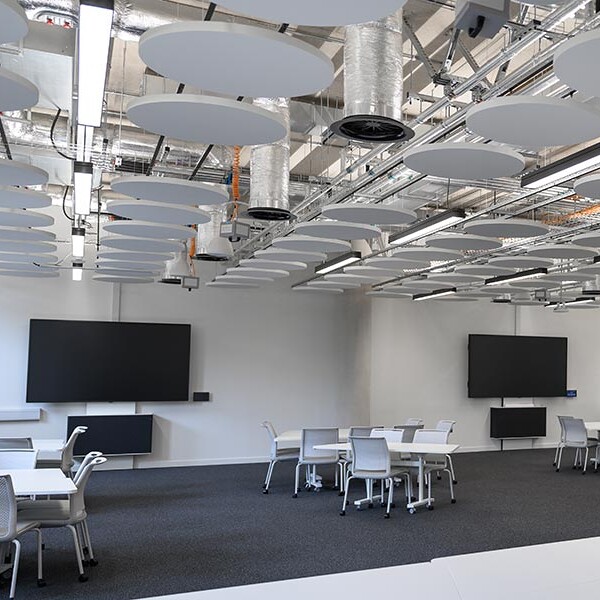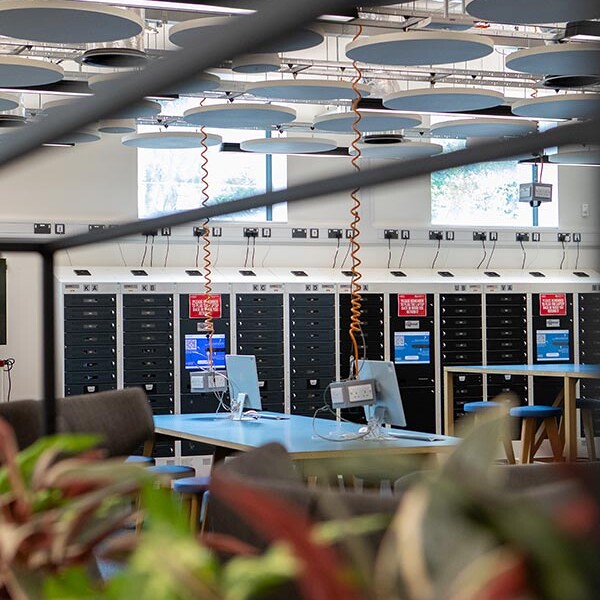
Cyber Security - BSc (Hons)
Currently viewing course to start in 2025/26 Entry.
The BSc Cyber Security course is designed to equip you with state-of-the-art technical knowledge, intellectual know-how, management capabilities and practical skills that will enable you to succeed in meeting the cyber security challenges facing modern organisations....
- Level Undergraduate
- Study mode Full Time
- Award BSc (Hons)
- Start date September 2025
- Fees View course fees
- Subject
- Location City Centre
This course is:
Available with Professional Placement year
Open to International Students
Overview
The BSc Cyber Security course is designed to equip you with state-of-the-art technical knowledge, intellectual know-how, management capabilities and practical skills that will enable you to succeed in meeting the cyber security challenges facing modern organisations. In the 21st century, data has become a necessary commodity, which has value in isolation and more so when viewed as a larger data set for trends and habits.
Data is key to the functioning of modern business and the protection of this data is key to the ongoing success of the digital economy. As systems, such as IoT, both generate and consume data grow in capability and complexity, the need to protect the data created, stored and transited across public and private networks intensifies. Due to this, the need for suitably qualified cyber security practitioners has never been greater.
This course will provide you with the knowledge and skills needed by the employers. Our strong links with industry enable us to teach the most demanding and up-to-date topics. You will learn state of the art technical knowledge, intellectual know-how, management capabilities and hands-on practical skills to succeed in meeting the cyber security challenges faced by modern organisations.
This course is supported by a vibrant research environment within the department of Networks and Cyber Security and by traditionally strong industrial links with CISCO, Oracle, IBM, Microsoft, UK Fast, Linux Professional Institute and BT.

Introducing STEAMhouse
STEAMhouse is a centre for technology, innovation, creative thinking, prototyping and business development. Our £70 million pound building is the home for all of our Computing courses.
What's covered in this course?
Secure information technologies form the bedrock of our modern connected mobile society. Our BSc Cyber Security course will equip you to enter this growing and important industry.
The course takes a practice-led approach, making use of equipment and tools found in the industry to give you the best preparation for a successful career. Our approach prioritises the practical skills sought by industry, backing this up with a thorough understanding of theory.
The course delivers a well-rounded curriculum in the security of the communication networks; the security of computer processing and storage equipment and the software that runs on it, both private and public, and both local and cloud based; the security and accuracy of information and information systems; and the forensic analysis of threats and attacks, as well as management-level skills such as project and change management, maximising your career potential.
Studying computing with us puts you at the heart of an exciting, innovative community. Upon graduation you could progress into a career as a cyber security engineer, network administrator, and cyber security analyst or network security architect.
Professional Placement Year
This course offers an optional professional placement year. This allows you to spend a whole year with an employer, following successful completion of your second year, and is a great way to find out more about your chosen career. Some students even return to the same employers after completing their studies.
If you choose to pursue a placement year, you will need to find a suitable placement to complement your chosen area of study. You will be able to draw on the University’s extensive network of local, regional, and national employers, and the support of our Careers teams. If you are able to secure a placement, you can request to be transferred to the placement version of the course.
Please note that fees are payable during your placement year, equivalent to 20% of the total full-time course fee for that year.
Accredited By
This course is accredited by:
Why Choose Us?
- Brand new facilities at STEAMhouse - This state-of-the-art building is the new home for our Computing courses. Based at our expanding City Centre Campus, this unique centre will give you access to outstanding facilities and teaching spaces, as well as opportunities to collaborate with people and businesses across multiple sectors and work on real industry-based projects.
- Student satisfaction - Top 20 in the UK for student satisfaction for Computer Science (Complete University Guide 2025).
- Home to Cisco Systems and Microsoft Academy Centre - We are one of Microsoft’s top UK university-based academics and we are a member of the Microsoft Developer Network Academic Alliance. This means we are able to use various Microsoft software products and online resources for research. We are also a Cisco ASC and one of only ten Cisco Instructor Training Centre’s in the UK.
- State-of-the-art facilities - You will be based at Millennium Point, within our City Centre Campus that has recently received £6.5 million investment in IT facilities and software, allowing you to work with industry-standard software development and simulation tools.
- Gain professional qualifications - From vendors such as Cisco, Microsoft and Linux Professional Institute. You will also have an opportunity to undertake an industry placement.
- Showcase your work - Innovation Fest is designed to foster entrepreneurship and support the development of our first-year students as future world-changers. The festival contributes to the knowledge economy, increasing students’ employability by providing genuine portfolio material.
Open Days
Join us for an Open Day where you'll be able to learn about this course in detail, chat to students, explore our campus and tour accommodation. Booking isn't open for this event yet, register your interest and we'll let you know as soon as booking goes live.
Next Open Day: 28 June 2025
Entry Requirements
These entry requirements apply for entry in 2025/26.
All required qualifications/grades must have been achieved and evidenced at the earliest opportunity after accepting an offer to help confirm admission and allow for on-time enrolment. This can also include other requirements, like a fee status form and relevant documents. Applicants can track their application and outstanding information requests through their BCU mySRS account.
Essential requirements
- Standard offer: 112 UCAS Tariff points. Learn more about UCAS Tariff points.
- Accelerate offer: 80 UCAS Tariff points. Find out more about BCU Accelerate.
If you have a qualification that is not listed, please contact us.
Fees & How to Apply
UK students
Annual and modular tuition fees shown are applicable to the first year of study. The University reserves the right to increase fees for subsequent years of study in line with increases in inflation (capped at 5%) or to reflect changes in Government funding policies or changes agreed by Parliament. View fees for continuing students.
Award: BSc (Hons)
Starting: Sep 2025
- Mode
- Duration
- Fees
- Full Time
- 3 years
- £9,535 in 2025/26 ✱ Important note for this price
- Apply via UCAS
(↩Back to price) * The Government is proposing to increase the cap on full-time regulated tuition fees to £9,535 for 2025/26 and the University is planning on increasing fees to that maximum level once legislation is enacted. Part-time fees are charged pro-rata, where applicable.
International students
Annual and modular tuition fees shown are applicable to the first year of study. The University reserves the right to increase fees for subsequent years of study in line with increases in inflation (capped at 5%) or to reflect changes in Government funding policies or changes agreed by Parliament. View fees for continuing students.
Award: BSc (Hons)
Starting: Sep 2025
- Mode
- Duration
- Fees
- Full Time
- 3 years
- £17,690 in 2025/26
Guidance for UK students
UK students applying for most undergraduate degree courses in the UK will need to apply through UCAS.
The Universities and Colleges Admissions Service (UCAS) is a UK organisation responsible for managing applications to university and college.
Applying through UCAS
- Register with UCAS
- Login to UCAS and complete your details
- Select your course and write a personal statement
- Get a reference
- Pay your application fee and submit your application
Guidance for International students
There are three ways to apply:
1) Direct to the University
You will need to complete our International Application Form and Equal Opportunities Form, and submit them together with scan copies of your original academic transcripts and certificates.
2) Through a country representative
Our in-country representatives can help you make your application and apply for a visa. They can also offer advice on travel, living in the UK and studying abroad.
3) Through UCAS
If you are applying for an undergraduate degree or a Higher National Diploma (HND), you can apply through the UK’s Universities and Colleges Admissions Service (UCAS).
You can request a printed form from your school or nearest British Council office. You will be charged for applying through UCAS. Birmingham City University’s UCAS code is B25 BCITY.
Personal statement
UK / EU students are required to submit a personal statement as part of their application for this course.*
The personal statement gives you a crucial opportunity to say why you’re applying and why the institution should accept you.
Here are the key areas you’ll need to address:
- Course choice - Why does this course appeal? What areas are of particular interest?
- Career plans - If you have a specific career in mind, say how your chosen course will help you pursue this goal.
- Work experience - Mention any work that is relevant to your subject, highlighting the skills and experience gained.
- School or college experience - Highlight skills gained at school/college, eg summer schools or mentoring activities.
- Non-accredited skills or achievement - eg Duke of Edinburgh Award, Young Enterprise scheme.
You should also mention your future plans – if you’re planning to take a year out, don't forget to give your reasons. Talk about any subjects you’re studying that don’t have a formal assessment and any sponsorships or placements you’ve applied for. And don't be scared to add in details about your social, sports or leisure interests.
Worried about Personal Statements?
If you've got no idea where to start or just want to check you're on the right track, we’ve got expert advice and real examples from our students to help you nail your personal statement. You can even download our ultimate personal statement guide for free.
*Non-EU students are not required to submit a personal statement when applying for this course.
Course in Depth
Year One
In order to complete this course, you must successfully complete all the following CORE modules (totalling 120 credits).
Within the Computer Systems Module, you will gain knowledge and experience of computers and computer hardware.
This module presents a holistic view of how computer systems work and it also provides the underpinning knowledge required:
- for the design of computer architecture
- to show how software interacts with hardware
- to apply electronics principles
- to use number systems for computer technology
The module introduces the fundamental elements of cybersecurity and its body of knowledge. It aims to develop a firm grounding in the underpinning knowledge and skills required to protect organisations from cyber-attack. You will be introduced to cybersecurity principles and implications of threats, vulnerability and risks facing these organisations.
In this module, you learn how modern operating systems are the glue that bind computer hardware and networks together and how they manage the user experience for individual computers and wider networks. We will focus on the function and purpose of operating systems, with a focus on hands-on practical skills.
We will build on learning from your networking, programming and computer systems modules, enhancing and extending skills in all these areas. You will make heavy use of Open Source Software, demonstrating what can be achieved with this huge publicly shareable resource on a very limited budget.
Within the module of Computer Programming you will learn the key skills of Programming and how this relates to technology and communications. Programming is an engineering tool that plays a vital role to drive most of the modern technologies surrounding us, including the technological devices for communication, transportation and entertainment.
In other words, it can be said that our modern lifestyles are heavily dependent on programming. Moreover, businesses increasingly rely on computers and the software run on them. Programming skills and a broader and deeper understanding of programming are therefore becoming increasingly important to the jobs market.
The module gives you the opportunity to learn mathematical concepts and methods and critically reflect on how they relate to computing and communication systems. You will develop core mathematical and statistical skills which are fundamental in computing and technical work in general. You will be expected to solve mathematical and statistical problems on paper and on a computer
The module provides the opportunity to learn and critically reflect the skills required in building and designing basic networks and their requirements within a network infrastructure. This module builds on the underpinning knowledge and theory of networking systems.
Year Two
In order to complete this course, you must successfully complete all the following CORE modules (totalling 120 credits).
Software is ubiquitous. Not only is it deployed on traditional computing platforms (such as workstations and servers), but it is also embedded in network equipment (such as routers and firewalls) and consumer devices (such as hearing aids and smartphones). In this module, we will explore the foundations of software security, important software vulnerabilities and attacks that exploit them -- such as buffer overflows, SQL injection, and session hijacking. The module explores defenses that prevent or mitigate these attacks, including advanced testing and analysis techniques. You will also learn how product vendors and services should manage exposed vulnerabilities and how vulnerabilities are being disclosed to stakeholders in an ethical way. It continues the software theme that you began at Level 4 when you studied the Computer Programming and Applied Operating Systems module.
The module has been designed to provide you with the necessary theoretical framework, foundations and practical support for understanding security solutions with reference to the application of cryptography, access control and a wider range of security attack categories and defensive approaches and systems.
This module begins with an introduction to the core principles and processes of a typical computer forensic investigation. It aims to develop a firm grounding in the underpinning knowledge and skills required to analyse and evaluate the authenticity of data from a computer and related data storage devices in a forensically sound manner. The module will teach you the fundamental data structures applicable to computer forensics and how various software tools can be employed to analyse these structures in a variety of case types.
The module provides you with an opportunity to build on the learning and to develop knowledge of cyber security and how it relates to information and network security. This module builds on Hardware and Security Fundamentals module and will allow you to protect a network system from issues of cyber-crime, based on security principles and the principles of how to defend networks from attack
In this module you will have the opportunity to learn and critically reflect on the skills required for Network Technologies. This module builds your knowledge and underpinning theory for the networking modules and you will review the requirements from a small to medium scale network deployment engineering context.
This module covers key areas of cryptography, including symmetric and asymmetric encryption algorithms, public key infrastructure (PKI), digital signature, digital certificates, key exchange and management.
In addition, the module will cover the application of cryptographic techniques to address security requirements such as confidentiality, integrity, authenticity, and non-repudiation. You will use various block cipher-based cryptographic algorithms such as Advance Encryption Algorithm (AES), RSA, Diffie-Hellman, and secure hash functions.
Professional Placement Year (Optional)
In order to qualify for the award of BSc (Hons) Cyber Security with Professional Placement Year a student must successfully complete the following module.
This module is designed to provide you with the opportunity to undertake a credit bearing, 40- week Professional Placement as an integral part of your Undergraduate Degree.
The purpose of the Professional Placement is to improve your employability skills which will, through the placement experience, allow you to evidence your professional skills, attitudes and behaviours at the point of entry to the postgraduate job market. Furthermore, by completing the Professional Placement, you will be able to develop and enhance your understanding of the professional work environment, relevant to your chosen field of study, and reflect critically on your own professional skills development within the workplace.
Final Year
In order to complete this course, you must successfully complete all the following CORE modules (totalling 120 credits).
The purpose of the module is to enable you to undertake a sustained, in-depth and research-informed project exploring an area that is of personal interest to you. In agreement with your supervisor, you will decide upon your topic which will take the form of a practical outcome (artefact) with accompanying contextual material. The main consideration when choosing your topic is that it must be aligned to the programme you are studying, and you should consider the relevance of this topic to your future academic or professional development.
The module provides you with an opportunity to learn and critically reflect on the skills of Ethical Hacking and information security within a global context. This module builds on the knowledge and underpinning theory from the networking modules and reviews the requirements for a secure network communication system.
As cyberattacks grow in volume and complexity, artificial intelligence (AI) is a vital tool assisting security operations analysts to stay ahead of threats. Looking after threat intelligence from millions of research papers, blogs and news stories, AI technologies like machine learning provide rapid insights to cut through the noise of daily alerts, drastically reducing response times. AI is a powerful tool for identifying vulnerabilities, threats, and attacks in cyberspace. AI-based cybersecurity can detect and analyse enormous amounts of data, seeking malicious patterns and providing necessary recommendations.
This module provides students with knowledge and practical skills essential for the acquisition, analysis and interpretation of evidence obtained from wired and wireless networked computers and storage systems. Emphasis is also placed on the evidence harboured by network hardware devices, such as routers and switches.
You will learn how to effectively retrieve valuable information from the Microsoft Windows Server operating systems and analyse the Active Directory for evidence pertaining to user policies, privileges and violations. You will also learn how to formulate and implement a strategy to acquire drive images as evidence files over networked computers.
One of the major objective of the computer science program is to introduce the theory, principles and technologies underlying the construction of modern computing systems. This module introduces, Cloud Computing which is the technology that enables on-demand computing resources (everything from applications to data centres) over the internet.
Download course specification
Download nowWe think it’s important that you are assessed in a number of different ways during your Cyber Security BSc (Hons) course. These will include including continuous assessment, in-class tests, examinations, laboratory exercises and project work.
Attendance requirements
For more information on attendance requirements, course contact time and suggested self-study hours, download the course specification.
International Opportunities
You are able to apply to undertake part of your studies abroad, allowing you to experience life and studying in another country at one of our exchange partner universities.
This offers a unique opportunity to enhance your CV and experience new cultures.

Athena Swan Bronze Award
We have successfully secured the Athena SWAN Departmental Bronze Award recognising a commitment to gender equality.
The Athena Swan Charter is a framework which is used across the globe to support and transform gender equality within higher education (HE) and research.
Employability
Enhancing your employability
Your studies here will equip you with the practical and academic skills that will help you to stand out when you look for your first professional role.
Because we have strong links with companies such as SAS, Microsoft, Cisco and Capgemini, you have the chance to work with and understand the workings of real-life industry from early on in your degree studies.
You will have access to world-class facilities throughout your time here and these will help you to be a highly employable graduate.
The University has a Graduate+ programme, an extracurricular awards framework that is designed to augment the subject-based skills that you’ve developed throughout the programme with broader employability attributes, which will enhance your employability options upon graduating.
Placements
You have the option undertake an assessed sandwich year between your second and third year, which will provide you with valuable work experience and give you the real-life skills you need.
Facilities & Staff
Our Facilities
We are constantly investing in our estate and are currently in the process of spending £260 million on new learning facilities. This course will be taught at Millennium Point at the City Centre Campus.
The course is supported with a wide range of cutting-edge facilities in the City Centre Campus. We have a state-of-the-art computer games technology lab which contains high-performance PCs, Sony PlayStation development kits and a range of industry standard software including Unity, Unreal and a suite of professional Microsoft development tools.
We also have many open access areas where students can study together and even hire out laptops for use in these spaces and others within the university.
Within the University there are many internationally recognised research teams giving you the opportunity to collaborate with them on exciting interdisciplinary projects.
Computer networking
The laboratories are well-equipped for all our computer networking courses, as well as specialist areas for practical work such as voice-over internet protocol (VoIP), forensic and ethical hacking technologies, wireless and mobile technologies and radio frequency identification technologies to name but a few.
Software development and computer programming
There are a number of open access, software development and computer programming laboratories that can be used to develop systems and programmes, including database management systems such as MySQL, to name but a few.
Systems laboratories
Our embedded systems laboratories are used to develop real-time systems, such as specialist hardware training and development resources, and industrial-standard software development and simulation tools. These include microcontroller software and robotics design and development, to name but a few.
Electronic systems
To underpin the basic principles of electronic systems, we have a well-equipped laboratory of general and specialist test and measurement kits, including powered prototyping development boards, dual power supplies, frequency generators and counters and digital multi-meters to name but a few.
Forensic computing
Our successful development of forensic computing has led to a specialist forensics laboratory that is fully equipped with essential hardware and software for this sensitive area of study. The laboratory includes high-spec PCs with built-in multi interface Tableau write blockers, EnCase and FTK computer forensic software and steganography detection and analysis software, to name but a few.
Our staff
Dr Yussuf Ahmed
Senior Lecturer in Cyber Security
Dr Yussuf Ahmed is a Senior Lecturer in Cyber Security and Director of the BSc/MSci Cyber Security Programmes at Birmingham City University. He is a Senior Fellow of the Higher Education Academy (SFHEA) and specialises in Information Security, Cyber Assurance, Network Security, Cyber risks, and Security Governance. Yussuf is an experienced Cyber...
More about YussufDr Mohamed Ben Farah
Lecturer in Networks and Cyber Security
Mohamed (BEng, MSc, PhD, HDR) is a Lecturer in Cyber Security at Birmingham City University. Prior to this position, he was a research associate in Cyber Security at the Institute for Signals, Sensors and Communications with the Department of Electronic and Electrical Engineering at the University of Strathclyde. Mohamed has published over 30...
More about Mohamed










